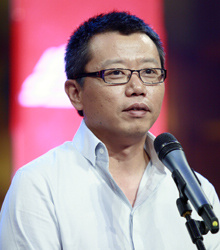 |
|
(CFP) |
Song Ke, former CEO of Taihe Rye Music Co. Ltd., has resigned from the post and was said to have opened roast duck business.
There is wide speculation Song retired due to declining record sales. Song said himself last year, "Records are dead."
Song, 46, is a famous music producer in China. He founded Taihe Rye and made it one of the most renowned music production companies in the country. Song also discovered and cultivated many stars in the music business including Ye Pei, Lao Lang and Pu Shu.
Surplus Shrinks
China's trade surplus narrowed 14.5 percent year on year to $155.14 billion in 2011, the General Administration of Customs (GAC) said on January 10.
The figure shrank from $295.47 billion in 2008, $196.07 billion in 2009 and $183.1 billion in 2010.
The country's foreign trade rose 22.5 percent in 2011 from a year earlier to $3.64 trillion.
Exports rose 20.3 percent to reach $1.9 trillion last year and imports grew 24.9 percent to $1.74 trillion.
Lending Recovery
Newly added yuan-denominated loans stood at 640.5 billion yuan ($101.18 billion) in December 2011, compared with 562.2 billion yuan ($88.82 billion) in November 2011, said the People's Bank of China, the central bank.
The December figure brought the amount for the entire year of 2011 to 7.47 trillion yuan ($1.18 trillion), down from 7.95 trillion yuan ($1.21 trillion) in 2010.
By the end of 2011, the outstanding broad money supply (M2), which covers cash in circulation and all deposits, rose 13.6 percent year on year to 85.16 trillion yuan ($13 trillion).
China's business climate index, a gauge for the country's macroeconomic outlook, continued to fall in the fourth quarter of 2011, and entrepreneur confidence further weakened during the previous quarter, the National Bureau of Statistics (NBS) said on January 6.
The quarterly business climate index, based on a survey of about 20,000 Chinese firms, dropped 5.2 points from the previous quarter to 128.2 in the fourth quarter.
Meanwhile, the entrepreneur confidence index, a measurement of the views and opinions of the country's entrepreneurs, fell 7.4 points to 122 in the last quarter of 2011.
Entrepreneur confidence in the real estate sector slid for seven consecutive quarters, plunging 18.4 points to 81.5 in the fourth quarter after falling below the boom-and-bust line of 100 in the third quarter of 2011.
China posted record high box office revenue of 13.115 billion yuan ($2.01 billion) in 2011, surging 28.93 percent from that of the previous year, said Tong Gang, Director of the Movie Bureau of the State Administration of Radio, Film and Television.
The box office revenue of domestic movies reached 7.031 billion yuan ($1.07 billion), while that of overseas films stood at 2.046 billion yuan ($312.37 million).
In 2011, China produced 791 movies of various types and low-cost movies had been developing at a fast speed.
China's box-office revenue has risen for nine consecutive years since the country began reforming its film industry in 2002.
Sales of passenger vehicles in China increased by 2.8 percent year on year in 2011, the lowest growth rate for those products since 1999.
Last year, China recorded sales of 13.7 million passenger cars, sports-utility vehicles, multi-purpose vehicles and minivans. In December, the sales number declined by 3.3 percent below what it had been in the same month a year ago, said China Passenger Car Association on January 10.
The decline came as the growth of the country's economy slowed and the government ceased favoring the industry with stimulus policies.
It brought an end to skyrocketing annual growth rates. The industry saw 46 percent growth in 2009 and 34 percent in 2010.
Insurance companies in China collected 1.43 trillion yuan ($226.4 billion) of premiums in 2011, up 10.4 percent year on year, according to data from the China Insurance Regulatory Commission (CIRC) on January 7.
Assets of the country's insurance companies totaled 5.9 trillion yuan ($900.76 billion) at the end of last year, compared with 5 trillion yuan ($763.36 billion) in 2010.
Property premiums rose 18.5 percent to 461.79 billion yuan ($70.50 billion) and life insurance premiums added only 6.8 percent to 969.98 billion yuan ($148.09 billion) in 2011.
Insured customers' claims amounted to 391.02 billion yuan ($59.69 billion) last year. | 